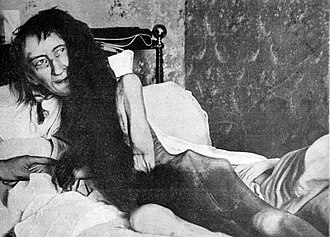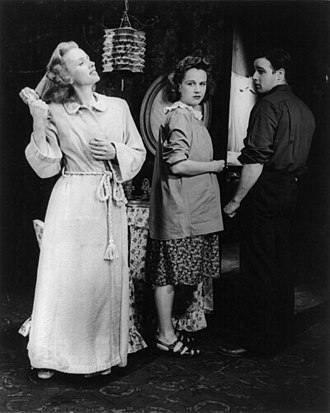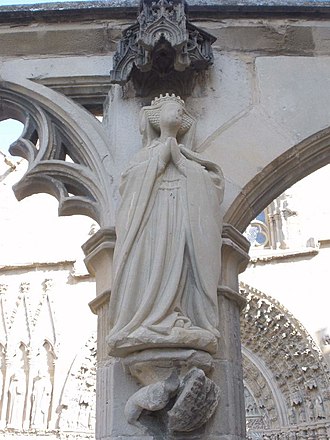Discover Your Roots
SIGN UPDiscover Your Roots
SIGN UPBlanche is a beautiful and timeless feminine given name of French origin, meaning "white." Derived from the Late Latin word "blancus," it likely started as a descriptive name for a girl with blonde hair or very fair skin. The name has been popular since medieval times, influenced by historical figures such as Blanche of Navarre and her royal descendants. In France, Blanche was among the top 100 most popular baby names between 1900 and 1928. It has also been favored in the United States, Canada, and England. Notable individuals bearing the name include French and Navarrese royalty, as well as fictional characters in literature, film, and games. Blanche continues to be a favored choice for parents seeking a classic and elegant name for their daughters.

Blanche Monnier (French pronunciation: [blɑ̃ʃ mɔnje]; 1 March 1849 – 13 October 1913) was a French socialite from Poitiers, France, who suffered a tragic fate of being secretly confined in a small room for 25 years by her own aristocratic mother and brother. Born into a well-respected, conservative bourgeoisie family, Blanche's life took a horrifying turn when her desire to marry an older lawyer was vehemently opposed by her mother. In retaliation, her mother locked her in a tiny, dark room in the attic of their home, where she languished in seclusion for a quarter of a century. Eventually, in 1901, an anonymous letter led to her discovery by the police, revealing the appalling truth of her captivity. Blanche was found emaciated, filthy, and living in squalid conditions, having not seen sunlight for 25 years. The shocking state of her confinement and her subsequent rescue garnered widespread attention. The aftermath saw arrests and public outrage, with Louise Monnier dying shortly after her arrest, and Marcel Monnier facing court proceedings. Blanche Monnier's tragic story remains a haunting reminder of the extremes of human suffering and the resilience of the human spirit.

Blanche DuBois, also known by her married name Grey, is a fictional character in Tennessee Williams' renowned play A Streetcar Named Desire. Described as an aging Southern belle, she grapples with insecurities about her fading beauty and seeks approval from others. Her character is a complex blend of fragility and desperation, depicted through her obsession with avoiding direct light and her history of sexual promiscuity. Blanche has been portrayed by various talented actresses both on stage and on screen, each bringing a unique interpretation to the role. With notable portrayals by Vivien Leigh in the 1951 film adaptation and Jessica Tandy in the original Broadway production, the character has left an indelible mark on the world of theater and film. The character's name is believed to be inspired by theater critic Blanche Marvin, while some critics speculate that Blanche DuBois may have been influenced by Williams' own mother. This iconic character continues to captivate audiences with her compelling portrayal of vulnerability and strength.

Blanche Baker, born on December 20, 1956, in New York City, is a well-known American actress. She gained fame for her portrayal of Ginny Baker in Sixteen Candles and for starring in the title role of Lolita on Broadway. Notably, she won a Primetime Emmy Award for Outstanding Single Performance by a Supporting Actress for her role in the television miniseries Holocaust. Baker's career extends to film, television, and theater. She made her television debut in the miniseries Holocaust and has appeared in various TV movies and series. In the theater, she originated the lead role in Edward Albee's adaptation of Vladimir Nabokov's Lolita and also portrayed Shelby in the first production of Steel Magnolias Off-Broadway. Additionally, Baker has made appearances in films such as Sixteen Candles, Cold Feet, and The Girl Next Door. Personally, she married movie director Bruce vanDusen in 1983, with whom she had three children before their divorce in 2002. She remarried in 2003 to Mark McGill, with whom she has one son. Baker continues to contribute to the entertainment industry, also taking on directing roles in films like Streetwrite and Make America Safe. For more information, you can visit Blanche Baker's IMDb page.

Blanche Kelso Bruce (March 1, 1841 – March 17, 1898) was a prominent American politician who achieved remarkable success despite being born into slavery. Representing Mississippi as a Republican in the United States Senate from 1875 to 1881, Bruce made history as the first elected African-American senator to serve a full term. His political career also saw him appointed as Recorder of Deeds in Washington D.C. during Benjamin Harrison's presidency. Prior to his political achievements, Bruce's early life was marked by his upbringing in slavery, where he was educated by his white father alongside his legitimate half-brother. Despite his challenging beginnings, he attended Oberlin College and later became a wealthy landowner in the Mississippi Delta. Bruce's legacy extends beyond his political career, as he was a participant in significant events celebrating the memory of Frederick Douglass and the American Negro Academy. He continued to serve in various roles, including as Register of the Treasury, until his passing from diabetes complications in 1898. Bruce's impact is commemorated through the naming of public school buildings and the declaration of his residence as a National Historic Landmark, known as The Blanche K. Bruce House. His remarkable life and accomplishments continue to inspire and serve as a testament to the enduring spirit and resilience of African-American leaders in the face of adversity.

Blanche I, also known as Blanca de Navarra, was a significant figure in European history, serving as Queen of Sicily and later as Queen regnant of Navarre. Born on July 6, 1387, she became the heiress to the throne of Navarre after the death of her sister, Joan, in 1413. Blanche married King Martin I of Sicily and became regent of Sicily during his absences. After Martin's death, she returned to Navarre and married John, becoming Queen regnant of Navarre. Blanche's pilgrimage to Santa María del Pilar in 1433 led her to establish a brotherhood and inspired chivalric traditions. She had a significant impact on Sicilian independence and was a popular regent in Sicily. Blanche passed away on April 1, 1441, leaving behind a legacy of royal leadership. Her life and accomplishments are commemorated in various historical references, including the naming of a Spanish Navy frigate after her. Blanche's story is an intriguing chapter in the political traditions of female rulership in medieval Europe.
All images displayed on this page are sourced from Wikipedia or Wikimedia Commons.We use these images under their respective Creative Commons or public domain licenses. Wherever applicable, author attributions and license information are provided. If you believe an image is used incorrectly or outside its license terms, please contact us so that we can review and correct the issue.